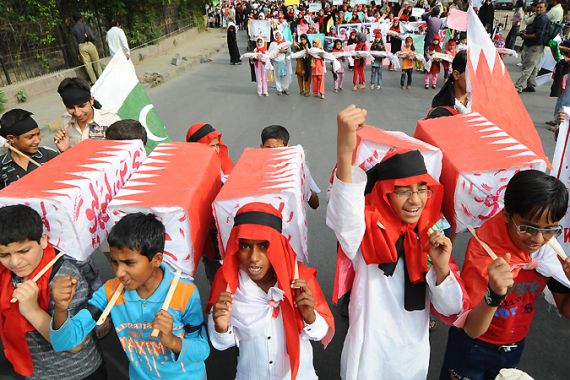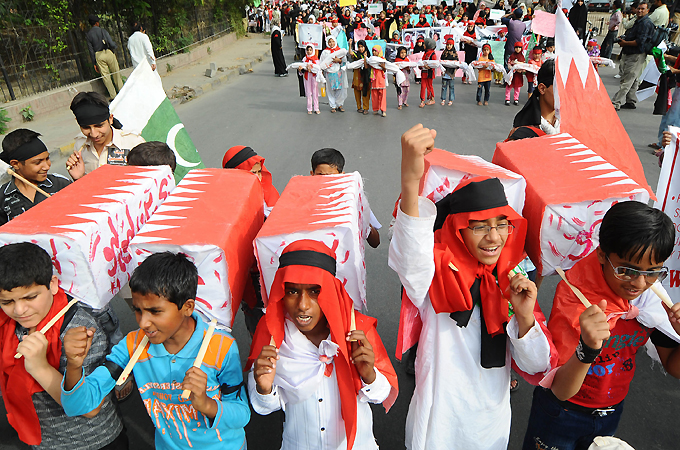Bahrain worshippers protest death sentences
Thousands denounce death sentences for anti-government protesters, and solidarity protests in Saudi Arabia and Pakistan.

 |
| Shia Muslims protested against a ruling by Bahrain’s military court sentencing Shia protesters to death [AFP] |
Thousands of Bahraini Shia Muslims have gathered before a revered cleric to denounce death sentences given to protesters over anti-government rallies crushed last month in the Gulf kingdom.
The verdict, handed down by a military court a day earlier to four men accused of killing two policemen in violent protests last month, could intensify sectarian tension in the Sunni Muslim-ruled state that hosts the US Navy’s Fifth Fleet.
“It’s not true that they killed them,” a man who identified himself only as Moussa said, after praying at the mosque of Sheikh Issa Qassim, as a police helicopter circled overhead.
“The government made it up just like a movie.”
He was referring to video footage that Bahraini authorities have circulated showing the two policemen smashed by a vehicle that sped through a crowd of protesters, some of whom appeared to then trample and kick the fallen men.
Police kept a tight grip on roads leading to the village where the mosque is located, turning back many vehicles.
The rulings were only the third time in over 30 years that a death sentence had been given to a Bahraini citizen.
The seven defendants were tried behind closed doors on charges of premeditated murder of government employees, charges which their lawyers denied.
They have further divided a country whose Shia majority says it faces systematic discrimination, but whose Sunni leaders claim Iran is trying to extend its regional influence by manipulating its co-religionists.
Opposition leaders argue the protests in February and March were about demanding more political freedoms and a constitutional monarchy, and that the government is trying to caste it in a sectarian light.
“The sentence was appropriate,” Mohammad al-Ammadi, a Sunni lawmaker, citing what he saw as the extreme brutality of the killings. “This is the first time this happened in Bahrain.”
In his sermon, the cleric Sheikh Issa Qassim alluded to the growing rift in the country.
“If you wish to be assailed with problems, to lose all comfort … then allow the spirit of antagonism to take hold and spread in your country,” he said.
“This is a fire which may seem manageable at first, but is ultimately beyond control … and its consequences are always grave.”
In the aftermath of the protests, hundreds of people have been detained, and at least three have died in custody. Human rights groups say hundreds of people have been sacked from public sector jobs and that Bahraini forces have seized patients and health workers from hospitals where protesters had been treated.
The latter assertion figured in a rare, mild rebuke of Bahrain from the United States on the heels of the court ruling, which included life sentences for three other men.
“Security measures will not resolve the challenges faced by Bahrain,” Heide Bronke-Fulton, a spokesperson for the US state department, said via email.
“We are also extremely troubled by reports of ongoing human rights abuses and violations of medical neutrality in Bahrain. These actions only exacerbate frictions in Bahraini society.”
Germany urged Bahrain on Friday to rescind the death sentences.
“This draconian punishment impedes the process of rapprochement and reconciliation in Bahrain,” Andreas Peschke, a spokesperson for the German foreign ministers, said on Friday.
Solidarity protests
More than 200 Shia Muslims protested in Saudi Arabia’s oil-producing east on Friday in solidarity with fellow believers in nearby Bahrain, who are facing a rolling crackdown, two activists said.
The gatherings in the towns of Awwamiyah and Qatif on Friday defied a call by leading Shia clerics last week for an end to rallies in the conservative Gulf kingdom’s Eastern Province, in an apparent bow to government pressure.
Shia activists in the area have held weekly protests over the past two months without major clashes with police.
“There was a protest of over 200 people in Awwamiyah, with the same demands as previous weeks. Police were present but far from the protesters,” one activist in Awwamiya told the Reuters news agency by telephone.
The Sunni Muslim monarchy of Saudi Arabia, the world’s top oil exporter and a major US ally, does not tolerate any form of public dissent.
Saudi protesters have called for solidarity with Shia in the nearby Gulf island kingdom of Bahrain, where a fierce crackdown has continued since anti-government rallies, led mostly by Shia, were crushed there in March.
Bahrain’s uprising unnerved Saudi Arabia, which is connected to the Gulf island kingdom by a causeway. Saudi authorities sent in troops after Bahrain’s rulers called on Gulf neighbours to support its crackdown.
In the Pakistani city of Lahore, Shia Muslims held a protest on Friday against the death sentence ruling in Bahrain, carrying symbolic coffins in a show of support.
Bahrain’s prime minister ordered the head of the country’s civil service and other senior officials to review procedures for firing state employees, the state news agency said a week ago.